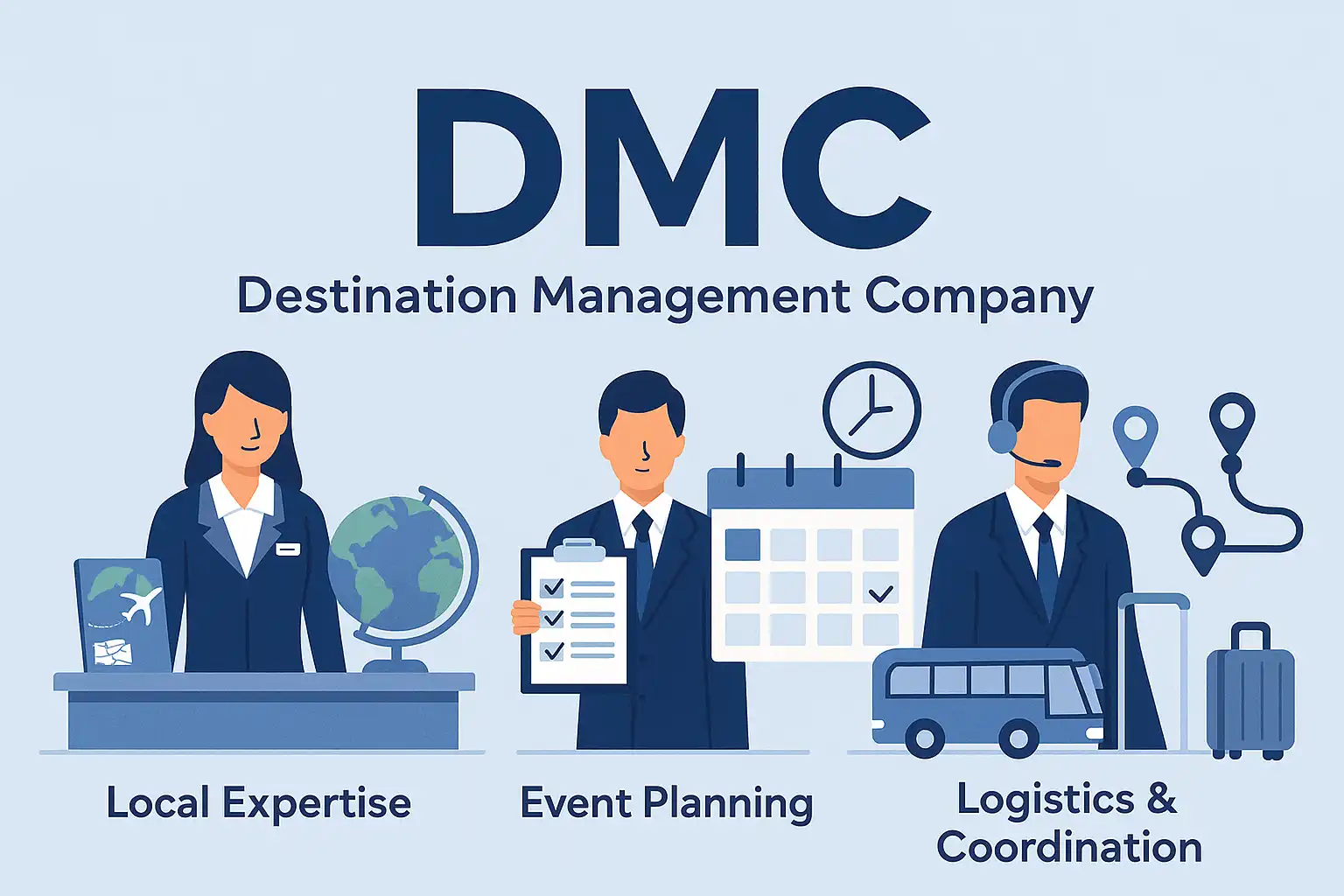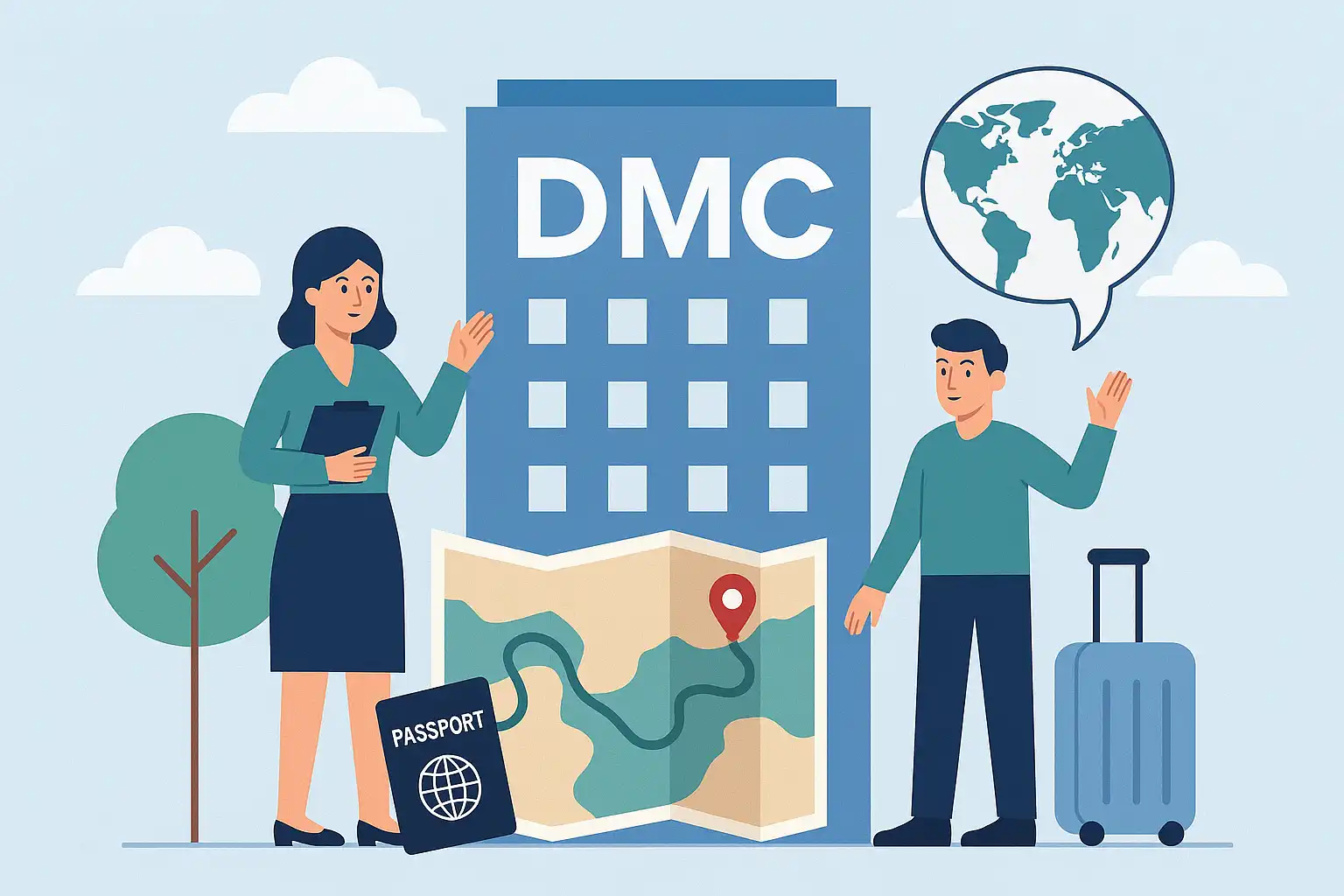DMC Meaning: Understanding Destination Management Companies
 Mika Takahashi
Mika Takahashi Mika Takahashi
Mika TakahashiPlanning corporate events or group travel in places you’re not familiar with can quickly become overwhelming. From figuring out local rules to coordinating with unfamiliar vendors and managing all the logistics, it’s easy for things to get complicated fast. That’s exactly why knowing the DMC meaning is so important for anyone involved in event planning or corporate travel.
DMC stands for destination management company. These specialized companies act as your local experts and behind-the-scenes coordinators when you’re organizing events, meetings, or group trips in destinations where you don’t have much local knowledge. Think of a destination management company as your trusted on-the-ground partner—they bring deep local insight, strong vendor connections, and smooth logistical coordination to turn complex event planning into a hassle-free success.
In this guide, we’ll walk you through everything about destination management companies: what they do, the benefits they bring, how they differ from travel agencies, and tips on choosing the perfect DMC for your needs.

Simply put, DMC means destination management company. These are professional service firms that specialize in providing comprehensive ground services and local know-how for events, tours, and corporate travel. Unlike general travel agencies that mostly sell flights and hotel bookings, a destination management company dmc is a local expert with deep knowledge of a specific destination.
They act as the crucial bridge connecting event planners, travel agencies, and a wide network of local suppliers needed to pull off successful events and travel experiences. With their understanding of local culture, strong vendor relationships, and access to specialized equipment, DMCs deliver memorable events that would be tough for outsiders to organize on their own.
The role of destination management companies has grown as the events industry has become more complex. Nowadays, corporate events demand more than just basic logistics—they require detailed program management including transportation, venue selection, catering, and cultural integration. That’s why the local expertise DMCs provide is so valuable in hitting your business goals.
Destination management companies cover a broad range of services to handle all the on-the-ground details for events, meetings, and group travel. Knowing what they offer can help you see why working with a dmc can truly transform your event planning.
Event planning and management is at the heart of what DMCs do. They take care of everything from the initial idea to the post-event wrap-up. This includes picking the right venue, coordinating with vendors, managing timelines, and overseeing the event on-site. Their local knowledge ensures cultural nuances and regulations are respected throughout.
Transportation coordination and logistics is another vital service. DMCs arrange all ground transportation—airport pickups, shuttles between venues, and special transport for group excursions. They don’t just book vehicles; they plan routes, consider traffic, and prepare backup plans for any unexpected delays.
Accommodation booking and management goes far beyond what you’d get from a typical travel agency. DMCs negotiate group rates, block rooms, handle special guest requests, and provide on-site support. Their strong hotel partnerships often lead to better amenities and VIP treatment for your group.
Conference venues and meeting spaces require insider knowledge of local facilities, capacity limits, tech capabilities, and availability. DMCs have detailed venue databases and can recommend the best options to fit your event's needs and budget.
Themed events and gala dinners highlight the creative side of destination management companies. They develop concepts, transform venues, book entertainment, and design cultural programs that leave a lasting impression on attendees.
Tour operations and excursion planning add extra value by crafting local experiences. DMCs create guided tours that mix education and fun, helping participants connect with the destination and each other.
Catering and hospitality coordination ensures meals and refreshments meet dietary needs, cultural preferences, and quality standards. DMCs work with trusted local vendors to deliver culinary experiences that celebrate local culture while satisfying international tastes.

Partnering with a destination management company offers benefits that go well beyond convenience. These advantages can make a real difference in your event’s success, cost efficiency, and risk management.
Deep local knowledge and cultural expertise is by far the biggest plus. DMCs know the destination beyond what tourists see—they understand business customs, legal requirements, seasonal factors, and cultural sensitivities that can make or break your event. This expertise helps you navigate everything from tipping etiquette to gift-giving traditions.
Established relationships with preferred suppliers give you access to top-notch vendors and pricing that outsiders can’t easily get. DMCs have long-standing partnerships that guarantee reliable quality and often better rates, especially during busy summer seasons when demand is high.
Cost savings through bulk purchasing power come from the volume of business DMCs bring to suppliers. Instead of paying retail prices for individual services, you benefit from group rates and package deals negotiated by your DMC partner.
Risk mitigation and compliance with local regulations protect you from legal headaches and operational hiccups. DMCs know the ins and outs of permits, safety rules, insurance, and other local requirements, keeping your event running smoothly.
Language barrier solutions and communication support remove one of the biggest challenges of international planning. Multilingual DMC staff handle vendor talks, emergency situations, and keep everyone informed throughout your event.
Time-saving for event planners and organizations means your internal team can focus on strategy and content rather than getting bogged down with logistics. Delegating local details to experts frees you up to create better business outcomes.
Destination management companies excel at turning complex events into smooth, well-run experiences. Their coordination covers many moving parts that would overwhelm individual planners.
End-to-end event management from start to finish ensures nothing gets missed. DMCs use project management systems to track every step—from initial planning to final billing—keeping quality high and details tight.
Coordination between multiple vendors and suppliers is a core strength. Instead of juggling dozens of contacts, your DMC acts as the central hub, making sure everyone knows their role and timing.
On-site support during events means quick fixes and quality checks happen in real time. Experienced DMC teams handle everything from tech glitches to weather surprises, so your event keeps flowing.
Emergency contingency planning and problem-solving show the professionalism DMCs bring. They have backup plans and protocols ready to tackle any unexpected issues efficiently.
One of the best reasons to work with a DMC is their ability to unlock experiences and venues that outsiders just can’t access.
Unique local attractions and hidden gems are treasures only locals know about. DMCs connect you with smaller venues, cultural spots, and special experiences that don’t show up in typical tourist guides but wow corporate groups.
VIP access to popular venues and events is possible thanks to the strong relationships DMCs build over time. Think private museum tours, exclusive dinners, or premium seats at cultural shows that elevate your event.
Customized cultural experiences and activities help teams engage meaningfully with local culture, boosting team building and cultural understanding. DMCs tailor these to your group’s interests and goals, always with cultural respect in mind.
Insider knowledge of the best local restaurants and entertainment means your dining and social plans hit the mark. DMCs know which places can handle your group’s size, dietary needs, and budget while delivering authentic flavor.

It’s important to understand how destination management companies differ from traditional travel agencies so you can pick the right partner.
DMCs focus on destination-specific services and local expertise, operating in a limited number of locations where they have deep knowledge and staff on the ground. This lets them offer tailored services that travel agencies can’t match.
Travel agencies mainly sell travel products like flights and hotel bookings, working broadly across many destinations. Their strength lies in booking and price comparison, not managing complex local logistics.
DMCs specialize in group events and corporate travel, handling detailed logistics and customized services for meetings, incentives, and events requiring special equipment and venues.
Travel agencies serve individual travelers and leisure bookings, focusing on convenience and standard packages.
DMCs provide on-ground event management and logistics, taking care of everything once travelers arrive—from transportation to activities and emergency support.
| Aspect | Destination Management Company | Travel Agency |
|---|---|---|
| Geographic Focus | Specialized local destinations | Broad geographic coverage |
| Primary Services | Event management and logistics | Flight and accommodation booking |
| Target Market | Corporate groups and events | Individual and leisure travelers |
| Local Presence | Permanent staff in destinations | Remote booking capabilities |
| Customization Level | Highly customized experiences | Standardized travel products |
Picking the right destination management company takes some careful thought. Your choice will impact your event’s success and how well you work together.
Look at experience and years in business as signs of reliability and know-how. Established DMCs have weathered market changes, built strong vendor networks, and developed solid systems. But don’t overlook newer companies—they might bring fresh ideas or specialize in emerging destinations.
Check their range of services and specialties to see if they match your needs. Some DMCs are pros at huge conferences; others shine with intimate incentive trips. Knowing their strengths helps you find the best fit.
Read client testimonials and case studies to get a sense of their track record. Look for stories showing creativity, problem-solving, and success with events like yours. Pay attention to how they handle challenges.
Decide between local vs. national DMCs based on your geographic needs. Local ones often offer deeper expertise and personal service; national ones might bring consistency and cost savings for multi-city programs.
Confirm they have staff on-site in your destination for proper support. Some companies claim local expertise but rely on subcontractors who may not meet their standards.
Use a structured approach to evaluate DMCs and find the right partner.
Send a detailed RFP and evaluate proposals carefully. Ask about local presence, vendor relationships, emergency plans, and past performance. Compare responses for thoroughness, creativity, and understanding of your needs.
Consider company values and CSR initiatives. Choose DMCs committed to sustainable tourism, fair labor, and community support. These values often lead to better event design and local relationships.
Look at technology and integration capabilities. Modern DMCs offer project management tools, mobile communication, and systems that sync with yours for smooth collaboration.
Check financial stability and insurance coverage to protect your organization from risks. Ask for proof of insurance, financial references, and business continuity plans.
Verify industry certifications and memberships like the Association of Destination Management Executives (ADME) that show professionalism and ongoing education.
Knowing some top destination management companies helps set expectations and benchmarks.
Ovation Global DMC is one of the largest, with a presence in over 100 destinations worldwide. Their scale brings consistent quality, technology, and vendor management.
Abercrombie & Kent specializes in luxury travel and safaris, showing how DMCs can carve unique niches.
Regional experts like Cititravel (Spain), Melur (Italy), and Amstour (Netherlands) offer deep local knowledge and personalized service, perfect for authentic cultural events.
Local leaders in major cities like New York, Munich, and Amsterdam build strong reputations through quality, innovation, and relationships, becoming go-to partners for big international events.
The variety of successful DMCs means there’s no one-size-fits-all. Some thrive on global scale, others on specialized local expertise. This diversity ensures you can find a partner tailored to your event’s needs.
Destination management companies serve many industries, each with unique demands.
Corporate event management and business meetings are the biggest market. These require complex logistics, professionalism, and business-focused amenities. DMCs help manage risk, control costs, and boost efficiency for everything from shareholder meetings to executive retreats.
Hotels partner with DMCs to offer guests unique local experiences while focusing on hospitality. This partnership helps hotels stand out and improve guest satisfaction.
Association conferences and conventions benefit from DMC knowledge for large, diverse events needing multiple venues, transport logistics, and cultural programming.
Incentive travel programs rely on DMC creativity and attention to detail to motivate and reward top performers with unforgettable experiences.
Weddings and special events showcase DMC creativity in personalizing complex logistics and delivering meaningful moments.
Educational and cultural group tours need specialized knowledge of museums, historical sites, and learning opportunities that standard travel agencies don’t provide.
This broad industry reach shows how versatile and valuable DMCs are. Whether your goal is business, education, celebration, or motivation, DMCs bring local expertise and operational skill to turn plans into exceptional experiences.
Knowing the DMC meaning goes far beyond just the acronym. Destination management companies are essential partners for anyone planning events, meetings, or group travel in unfamiliar places. Their blend of local expertise, vendor connections, and operational skills turns complicated logistics into smooth, successful experiences that meet business goals and create lasting memories.
From transportation and program logistics to cultural experiences and emergency support, DMCs have become indispensable in the events industry. As corporate travel and events continue to evolve, their value only grows.
Whether you’re organizing corporate events, incentive trips, or large conferences, knowing how to choose and work with a destination management company will boost your chances of success. Investing in professional DMC services pays off with better efficiency, less risk, cost savings, and happier attendees.
When planning your next event or group travel, think about how partnering with experienced local experts can turn a good plan into an exceptional experience—one that supports your business goals and connects your team to the local culture and community.